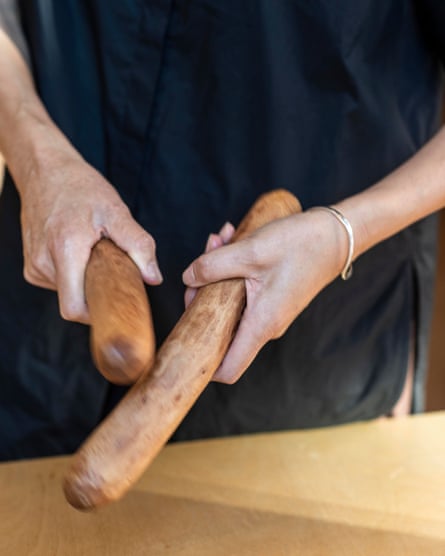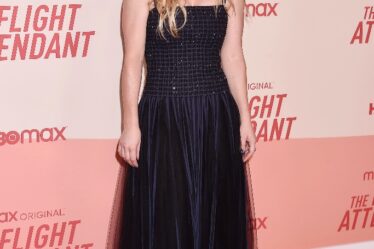
Kylie Kwong is one of Australia’s most respected names in food – as evidenced by the Order of Australia medal she received this year for services to the hospitality industry.
The chef, author and restaurateur has plenty of experience in the food world, having led her Sydney restaurant Billy Kwong for nearly two decades, as well as a much-loved stall at the city’s Carriageworks farmers market. In 2021 she opened her current eatery Lucky Kwong – named after the son she and her wife lost years earlier.
At Lucky Kwong, the chef and her staff use a unique and deeply meaningful item during service. Here, she tells us her special way of signalling a meal is ready, as well as the stories of two other important belongings.
What I’d save from my house in a fire
I would take my son’s tiny box of ashes which sits on an altar in our bedroom. In 2012, my wife Nell and I very sadly had a stillborn son whose name is Lucky Kwong. The last 11 years have been intense, often dark, and complex – yet truly transformational.
In my eatery at South Eveleigh, named in his honour, I have finally found a space to channel my maternal love for our precious Lucky. Even though I could not mother and nurture him in the traditional sense, I feel deeply blessed that I now have him as my “spirit guide”. Lucky and I communicate often: he is the driving force behind my business and day-to-day life.
My most useful object
Months before I opened Lucky Kwong, my dear friend and longtime collaborator Clarence Slockee showed me how to craft a set of clapping sticks that I could use in the eatery. Clarence is a Cudgenburra and Bundjalung man, and the First Nations mentor and horticulturist at South Eveleigh who takes care of all the green space there. He found several fallen branches from lemon-scented gum trees located onsite. He cut them to size and showed me how to sand and oil them.
Instead of a bell, I use these during service at Lucky Kwong to call food away at the kitchen pass. Their distinct, earthy sound and natural beauty attract immediate attention, allowing my staff and I to share the story of their significance and to offer acknowledgment, respect and support to the local First Nations community in Eveleigh and nearby Redfern.
The item I most regret losing
I appreciate good quality cars. In my early 20s I was excited with my very first car, an original Mini Clubman S, which was classified as a “classic car”. I think my father (who had lovingly restored his own classic car, an MGB Mark II) was more excited than I was and helped me detail the Mini to my liking.
Dad and I decided to paint it from its original white to a deep burgundy with racing stripes down each side. We fitted it out with an original wooden gearshift knob, a wooden steering wheel, and an excellent sound system. That car was my pride and joy; every time I’d stop at the traffic lights, people would be eyeing it off. I had saved up my own money to pay for this car, and it was an opportunity for Dad and I to connect after many years of a difficult relationship.
But after just six months, disaster struck. One morning as I went to drive to work, I could not find my Mini which I would park outside the place I was renting. I wandered the surrounding streets for half an hour in disbelief, scratching my head, thinking I had forgotten where I had parked it. But then reality set in and I realised my beloved Mini had been stolen.



